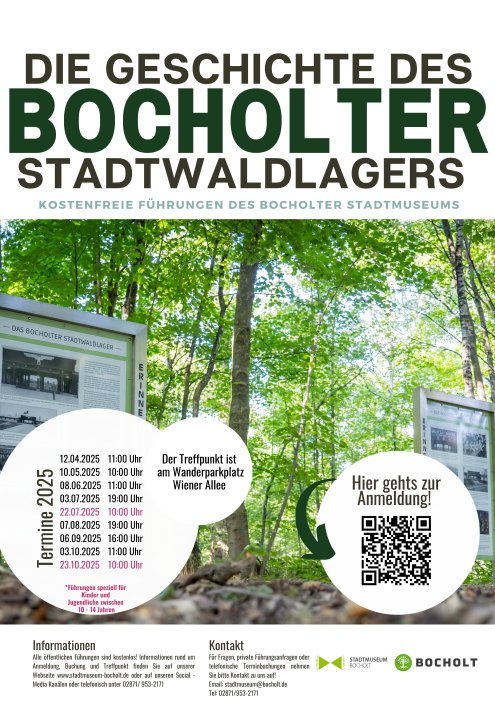The history of the Bocholt city forest camp
The Bocholt City Museum is once again offering free guided tours on the history of the Stadtwaldlager. Numerous dates can be booked online. The meeting point and starting point for the guided tours is the hikers' car park on Wiener Allee.
The Bocholt City Museum is continuing its successful series of historical tours on the eventful history of the Bocholt city forest camp this year. A total of nine free public tours will take place between 12 April and 23 October 2025.
The city forest camp is an important testimony to Bocholt's history and reflects the political upheavals of the 20th century. Among other things, the site served as the location of the so-called Austrian Legion (1935-1938), later as a prisoner of war camp during the Second World War and in the post-war period as a transit camp for displaced persons from the countries behind the "Iron Curtain". From a small part of the camp, the "Palestine Transit Camp", a total of around 6,000 former Jewish prisoners from ghettos and concentration camps were brought to the British Mandate of Palestine in 1947/48. These historical events still characterise the memory of the Stadtwaldlager today.
"The offer is met with great interest every year", explains museum director Lisa Resing. "We have already received many requests for new dates this year too. We are delighted to finally be able to fulfil this interest"
Special offer for children
In addition to the regular guided tours, there will once again be two special dates for children this year. These child-orientated tours will teach young participants about the history of the camp in an age-appropriate way.
Historian Werner Loock will guide visitors through the history of the Stadtwaldlager, using historical images and the latest scientific findings to explain the living conditions of the inmates and the impact on the Bocholt population. The first camp residents - National Socialists of the Austrian Legion - and the prisoners of war who were imprisoned in the Stadtwaldlager between 1939 and 1944 are particularly highlighted.
Registration and further information
All public tours are free of charge, but prior registration is requested



